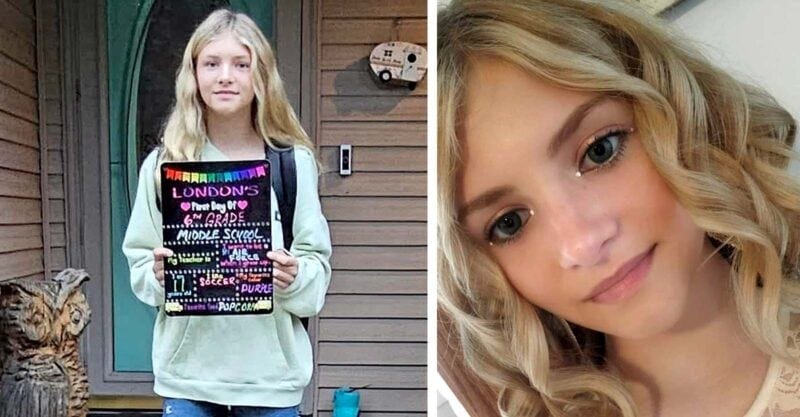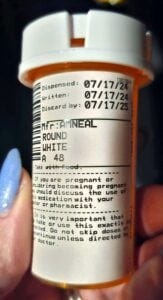12-Year-Old Died by Suicide 3 Weeks After Starting Prozac, Mother Blames Social Media and Antidepressants
Our society is very sick... when a child’s cry for help is silenced by a pill.
This article originally appeared on The Defender and was republished with permission.
Guest post by Suzanne Burdick, Ph.D.
A 12-year-old girl took her own life just three weeks after starting Prozac, following years of social media addiction that contributed to her depression. Her mother, Charay Gadd, has joined a lawsuit accusing TikTok, Snapchat and YouTube of targeting vulnerable children with harmful content.
After four years of addictive social media use fueled her depression, a 12-year-old girl committed suicide just three weeks after being placed on Prozac, according to her mother, Charay Gadd.
Prozac, or fluoxetine, is a serotonin reuptake inhibitor (SSRI) that works by blocking the brain’s reabsorption of serotonin, according to the Mayo Clinic. SSRIs are the most commonly prescribed antidepressants. Serotonin helps nerve cells communicate and affects mood, sleep, digestion, nausea and other functions.
On the night of July 31, 2024, London Izabella-Ryén Gadd swallowed dozens of pills from her home’s medicine cabinet, including roughly 40 bupropion pills, an antidepressant sold as Wellbutrin; 18 aspirin tablets; and unknown amounts of azithromycin and penicillin, according to her medical records, which Charay shared with The Defender. London died hours later at a local hospital.
Now, over a year later, Charay is still coming to grips with the loss of her daughter.
In Charay’s view, addictive social media platforms and SSRIs created a “perfect storm” that led to London’s death. “I hate that analogy, but that’s how I feel,” she said.
Charay joined a lawsuit claiming social media platforms are marketing dangerous products to children and adolescents. The suit alleges TikTok bombarded London with depression- and suicide-themed content, even when she searched for harmless topics like “alligator skin boots.”
“We wouldn’t have put her on SSRIs if the social media stuff wasn’t happening,” Charay said.
Charay wants lawmakers to ban SSRI prescriptions for children and teens. She said:
“You don’t even allow them to vote because of their brain development and things like that, or drink alcohol and make these judgments, but you’re putting them on brain-altering medications at 12 years old.”
#ad: Your diet isn’t perfect—and that’s okay.
Global Healing’s Organic Multivitamin is here to help you fill the gaps with over 30 essential vitamins and minerals your body needs to feel its best.
There are no coatings, no fillers—just clean, high-quality nutrients your body can actually use. It’s a simple, effective way to support your daily health and give your body the care it deserves.
Experience the difference you can actually feel. Use code VFOX at checkout for 10% off your order.
DISCLOSURE: This is an affiliate link. I may earn a commission if you make a purchase here, at no additional cost to you.
Antidepressant prescriptions soar for teen girls
The Citizens Commission on Human Rights, a mental health industry watchdog, warned this month that doctors are writing antidepressant prescriptions for adolescent girls at alarming rates, creating a “public health crisis” fueled by “conflicts of interest between psychiatry and the pharmaceutical industry.”
Between 2020 and 2022, the number of U.S. girls ages 12-17 prescribed antidepressants increased by roughly 130%, according to a 2024 study published in Pediatrics.
The U.S. Food and Drug Administration (FDA) issued a black box warning in 2004 requiring drug companies to alert the public about an increased risk of suicidality in children and teens for SSRIs.
The FDA looked at 24 clinical trials involving over 4,400 young patients taking SSRIs. Patients on an SSRI faced double the risk of suicide (4%) during the first few months of treatment compared with the 2% risk reported in patients who received a placebo.
“Not to mince words, this means you are more likely to attempt suicide on the drugs than if you were given a placebo — this is a damning finding about the effectiveness and safety of these drugs,” said Dr. Josef Witt-Doerring, a psychiatrist who specializes in identifying and treating psychiatric adverse drug reactions and a former FDA medical officer.
‘All I kept getting told was it was the safest drug out there’
Charay said London’s psychiatrist never informed her of the warning when recommending Prozac for her daughter.
“I still have the bottle,” she said. “There was no suicide ideation warning. There was no black box warning, none of it. … All I kept getting told was it was the safest drug out there.”
Charay hesitated to put London on 10 milligrams (mg) of the SSRI because her daughter had tried 5 mg in October 2023 but stopped using it because London told her she didn’t like how it made her feel.
London was taken to Pine Rest pediatric mental health facility in Grand Rapids in October 2023 and again in July 2024.
The psychiatrist at Pine Rest told Charay that London hadn’t given the drug enough time to work.
“For about a year and a half, I was giving her vitamins to try to avoid medication, but we as a society are led to believe that psychiatrists and doctors know best,” Charay said.
Charay agreed to having London go on Prozac after the psychiatrist implied he would keep London at Pine Rest longer if she didn’t allow London to be medicated.
On July 10, 2024, London began taking Prozac prescribed by her psychiatrist, while also seeing a counselor and taking vitamins to support her mental health.
Charay said the psychiatrist told her the prescription was for 10 mg of Prozac, but she later discovered it was for 20 mg.
Three weeks later, London ingested the slew of pills.
Just 18 hours before her overdose, London sent distressed text messages to her counselor, begging for help. The counselor never reached out to London’s family about the texts or conducted a wellness check, Charay said.
Charay typically kept the family’s medicine cabinet locked, but London apparently picked the lock and stashed four pill bottles in her backpack. Late on the evening of July 31, 2024, London began complaining of stomach pain.
London eventually admitted she’d taken a bunch of pills. According to Charay, her daughter began screaming, “I’m sorry. I didn’t mean it.”
Charay told London they needed to rush to the emergency room (ER) to have her stomach pumped. On the way to the car, London vomited 70-80% of the pills, Charay said.
They reached Memorial Healthcare in Owosso, Michigan, in less than 10 minutes.
It was around 10 p.m. The staff were “moving so slow,” Charay said. “They actually had the audacity to ask us to sit in the waiting room.”
A staff member called Poison Control and was told to expect a call back with recommendations from a toxicologist. When London died hours later, Poison Control still hadn’t returned the call, Charay said.
ER staff refuse to pump London’s stomach or give her activated charcoal
Charay begged the staff to pump London’s stomach, but they refused, saying it was “old school,” she said. They also denied Charay’s repeated requests to give London activated charcoal, which can help neutralize poisonings.
Later, Charay learned the hospital fired the entire ER staff, except for the doctor who oversaw London’s care. The doctor was transferred to a different hospital.
At 11:05 p.m., an ambulance arrived to take London to a hospital in Lansing. However, no one loaded London into it, although Charay had signed the transfer papers by 11:18 p.m. Charay said:
“We kept asking them why they weren’t getting her in the ambulance and the ambulance people just kept saying they were getting her ready for the ambulance. So it made no sense to us. They weren’t doing anything.”
By 12:30 a.m., London began seizing. The doctors gave her Ativan, which initially stopped the seizure. When seizures continued, they administered Keppra, an anticonvulsant, and an injection of Versed, a relaxant.
Medical staff intubated London because of the seizures and concerns about an “unsafe transfer,” according to her medical records.
London was given more drugs, including Fentanyl, Propofol and Levophed.
Charay asked the doctor if the drugs were “going to mess with” London’s heart. The doctor said no. Roughly 10 seconds later, London went into cardiac arrest.
Staff initially restored London’s heartbeat, but she coded multiple times afterward and could not be resuscitated.
Doctors pronounced her dead at 2:39 a.m. on Aug. 1, 2024, listing “toxic effects of bupropion” as the cause of death on her death certificate.
Lawsuit alleged ‘inherently dangerous’ social media products caused deaths
Charay joined a lawsuit on behalf of London and other teens, alleging that social media companies knew their products were “defective and/or inherently dangerous” but still marketed them to children and adolescents.
Plaintiffs include the surviving parents of two other teens who died by suicide after heavy social media use. They allege the companies caused wrongful deaths through a “willful disregard for human life.” In London’s case, the defendants include TikTok; Snap, the parent company of Snapchat; and Google, the parent company of YouTube.
The plaintiffs have demanded a trial by jury and are suing for numerous damages, including medical and funeral expenses, lost earnings and attorney fees.
According to the complaint filed May 28, 2025, in the Superior Court of California, County of Los Angeles, the companies designed “defective products that caused serious injuries to users” and failed to provide “adequate warnings about serious and reasonably foreseeable health risks from product use.”
London “had always been a sweet and happy child” until age 8, when she started using social media platforms in 2020 during the COVID-19 pandemic. The lawsuit also stated:
“As the foreseeable result of Defendants’ extended use designs and other defective and/or inherently harmful designs and actions, London developed harmful dependencies on these platforms, resulting in sleep deprivation, depression, anxiety, suicidal ideation, other serious mental health harms not experienced prior to when such use began, and, eventually, death.”
London first went to the hospital with thoughts of self-harm in 2023. According to the complaint, her condition worsened by early 2024.
In early 2024, London completed paperwork with a law firm handling social media addiction cases. When asked to explain whether she was addicted to social media, London wrote that social media is “All I think about. My mom ask me to get off, and less than 1-2 minutes, I’m sneaking back on.”
After the first law firm failed to act, Charay contacted the law firm that later filed the May 28 complaint on their behalf.
After London’s death, her family started a scholarship in her name to help her classmates pursue their dreams. According to the scholarship’s GoFundMe page:
“London was a beacon of light in our lives, known for her love of family, contagious laughter, and the beautiful smile that brightened every room. Her passion for soccer, art, and reading inspired those around her, and she held a dream of joining the Air Force to become a commercial pilot.
“We believe that creating a scholarship in her honor will continue her legacy and empower future generations to pursue their dreams.”
‘Medication, if used at all, should be a last resort’
The risk of suicidality in young teens on SSRIs is small in overall numbers, “but real and clinically important,” said Witt-Doerring.
Researchers are unclear whether girls face more drug-specific risks than boys. Girls’ higher suicide rates on SSRIs may be because they report higher rates of depression and receive more SSRI prescriptions than boys.
Witt-Doerring, who recently spoke on an FDA panel about the need to increase warnings about SSRI risks during pregnancy, said families deserve “plain-language disclosure that, on average, SSRIs increase the risk of suicidal behaviors in youth.”
“Frankly, if most parents understood these odds, many wouldn’t agree to start their child on one unless every other strategy had failed,” he said.
Witt-Doerring urged parents to use non-drug treatments whenever possible if their children experience depression or anxiety.
“For mild to moderate cases, begin with psychotherapy, family and school interventions, sleep support, nutrition and digital hygiene,” he said. “Medication, if used at all, should be a last resort — and only as part of a broader plan.”
If a child or teen takes an SSRI, parents should monitor them closely for signs that the drug is making symptoms worse. This can include impulsive behavior, obsessive dark thoughts, restlessness or paranoia.
Dr. David Healy, a psychiatrist who also spoke at the FDA panel on SSRI risks during pregnancy, said parents can tell within two to three days if an SSRI is helping their child. “If there is not a helpful effect as early as that, you should stop them,” he advised.
Witt-Doerring also encouraged families to create an SSRI exit plan, since the drugs can trigger discontinuation symptoms. “The longer someone stays on, the harder it can be to come off. So families should have a taper strategy and non-drug supports in place from day one,” he said.
Study: Overdose suicide attempts linked to nighttime screen use, unlocked medicine
A study presented last week at the American Academy of Child and Adolescent Psychiatry’s annual meeting in Chicago echoed the themes in London’s case.
Researchers from the Virginia Tech Carilion School of Medicine surveyed youths ages 12-17 who were admitted to the hospital after intentional overdose suicide attempts. They found that the suicide attempts tended to occur late at night, while the teens were using screens or shortly afterward.
“We need to be aware that access to technology such as the internet and social media overnight, or for unlimited periods with minimal monitoring, does increase the risk for self-harm,” Dr. Timothy Ferrebee, one of the study’s authors, said in a statement.
The study also found that both prescription and over-the-counter medications were often involved, highlighting that parents should lock up all drugs, not just prescription medications.
Suspected suicide attempts by poisoning among adolescents rose more than 30% between 2019 and 2021, the Centers for Disease Control and Prevention reported. Among children ages 10-12, the increase was over 70%.
This article has been updated to clarify that bupropion (Wellbutrin) is an antidepressant, but is not an SSRI. It is a norepinephrine and dopamine reuptake inhibitor or NDRI.
Related articles in The Defender
‘Addictive Use’ of Screens Linked to Higher Risk of Suicide in Kids, Study Finds
Suicide Now 5th Leading Cause of Death Among Preteen Boys and Girls
Journal Faces Lawsuit Over Discredited Study Used by GSK to Market Dangerous Antidepressant to Teens
Antidepressants During Pregnancy Raise Risk of Birth Defects, Doctors Tell FDA
Donate to Children’s Health Defense




